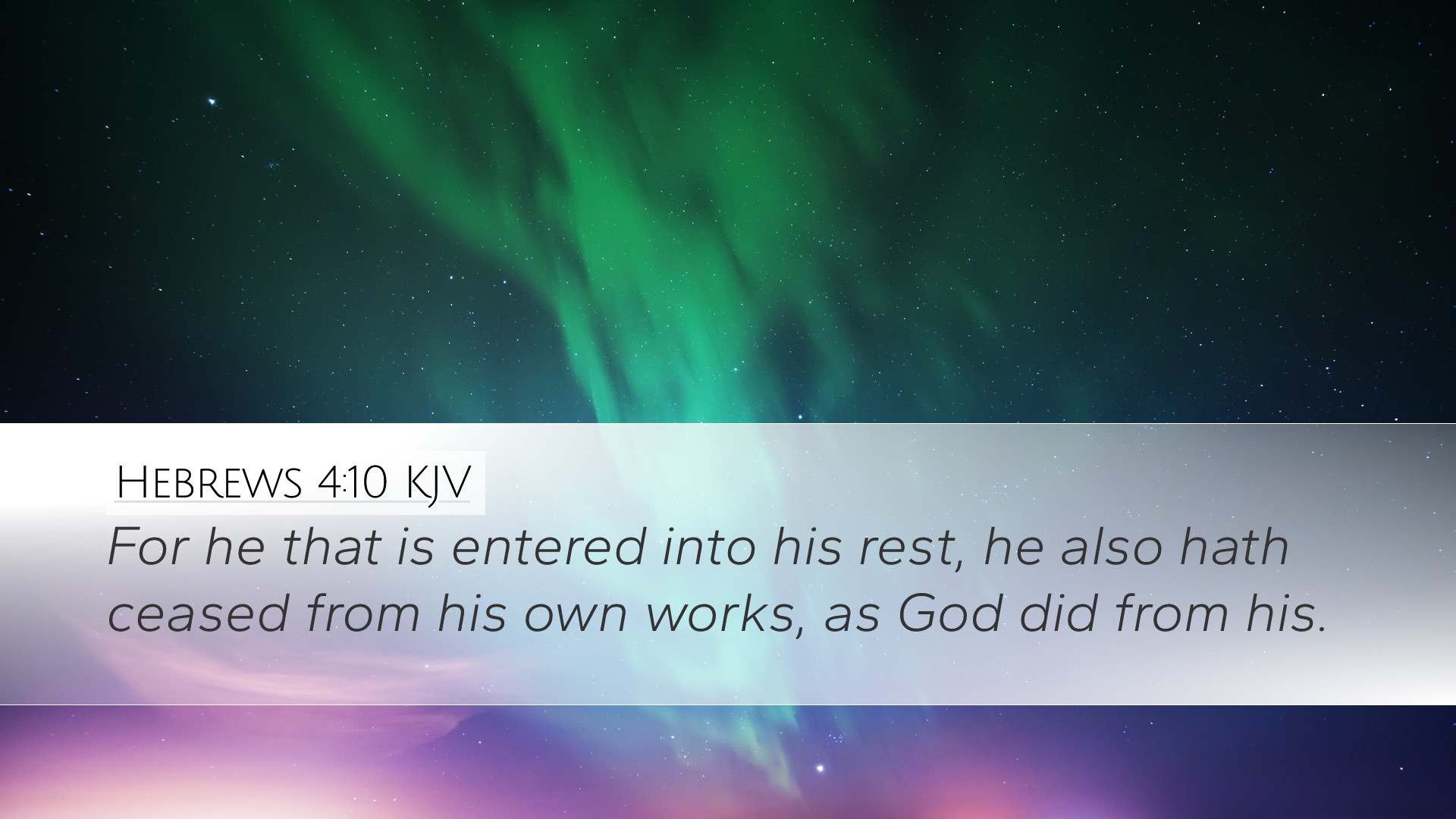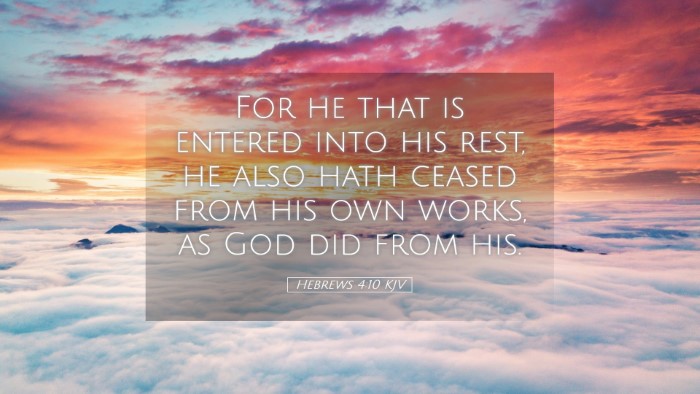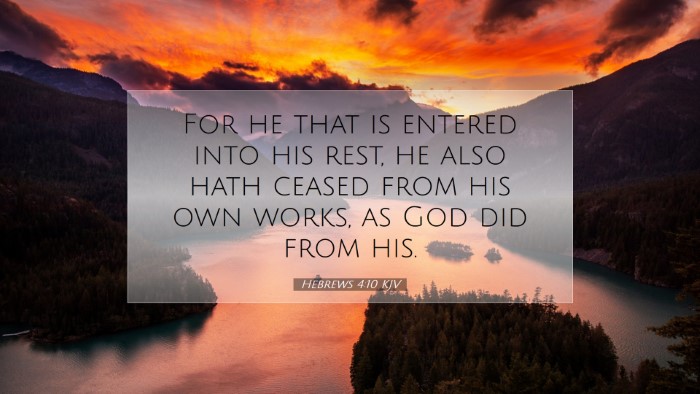Old Testament
Genesis Exodus Leviticus Numbers Deuteronomy Joshua Judges Ruth 1 Samuel 2 Samuel 1 Kings 2 Kings 1 Chronicles 2 Chronicles Ezra Nehemiah Esther Job Psalms Proverbs Ecclesiastes Song of Solomon Isaiah Jeremiah Lamentations Ezekiel Daniel Hosea Joel Amos Obadiah Jonah Micah Nahum Habakkuk Zephaniah Haggai Zechariah MalachiHebrews 4:10
Hebrews 4:10 KJV
For he that is entered into his rest, he also hath ceased from his own works, as God did from his.
Hebrews 4:10 Bible Commentary
Commentary on Hebrews 4:10
Text of the Verse: "For he that is entered into his rest, he also hath ceased from his own works, as God did from His."
Introduction
This verse from the book of Hebrews presents profound theological implications regarding rest, the cessation of works, and the divine example set by God. In this commentary, insights from Matthew Henry, Albert Barnes, and Adam Clarke will be synthesized to illuminate the passage's meaning and relevance for contemporary readers, particularly pastors, students, theologians, and Bible scholars.
Contextual Analysis
The concept of "rest" in Hebrews is deeply rooted in the Old Testament, particularly in relation to the Israelites' entrance into Canaan. The author of Hebrews draws this parallel to illustrate a more profound spiritual rest that believers find in Christ.
Matthew Henry emphasizes that this rest is not merely a physical or temporary respite, but a permanent state of peace and assurance found in faith. He notes that just as God rested on the seventh day after the creation, believers are invited to partake in God's rest, signifying a complete trust in divine provision and salvation.
The Nature of Divine Rest
Understanding Divine Rest: The rest mentioned in this verse signifies a cessation from our own labors and the embrace of God's grace. "He that is entered into his rest" indicates a transition from striving for justification through works to resting in the completed work of Christ.
- Rest as a Promise: Albert Barnes points out that this rest is akin to God's promise to His people, reflecting a fulfillment that is not yet complete for those who continue to reject Christ. The author of Hebrews encourages readers to enter into this rest by preserving their faith.
- Contrast with Human Works: The phrase "ceases from his own works" highlights a shift from human effort to divine acceptance. Adam Clarke elaborates that this resting from works means that salvation is not earned but received, which is foundational in Pauline theology regarding grace.
Theological Implications
This verse carries significant implications for understanding salvation, rest, and works in the believer's life.
- Salvation and Grace: Matthew Henry notes that believers are called to cease from labors that aim to establish righteousness through deeds, instead embracing the righteousness of Christ. This transition reflects a decisive moment in the believer's journey, affirming salvation by grace alone.
- Symbolism of Rest: Albert Barnes explains that the rest embodies a state of peace and security in God's presence, representing the ultimate hope for believers who trust solely in Christ for redemption.
- Practical Application of Faith: Adam Clarke emphasizes that true faith manifests itself in resting upon God's promises. This act of faith leads to spiritual maturity, as Christians learn to depend on God's strength rather than their frail attempts at piety.
Application for Believers
This verse challenges modern believers to examine their reliance on personal works versus the sufficiency of Christ's work. It calls for a deeper understanding of what it means to rest in God’s grace.
- Embracing the Rest: Pastors are encouraged to lead congregations in embracing this divine rest, teaching that true peace comes not from striving but from trusting in God's promises.
- Rejection of Performance Mentality: Students and scholars should critically evaluate the cultural tendency towards a performance-based faith, recognizing that Scripture calls for a radical shift towards grace.
- Encouragement through Trials: The profound truth of this verse serves as a source of encouragement during trials, reminding believers that God's rest is their heritage, irrespective of life’s circumstances.
Conclusion
Hebrews 4:10 serves as a rich theological reminder of the rest that is available to believers through faith in Christ. As derived from the insights of Matthew Henry, Albert Barnes, and Adam Clarke, this passage invites us to reflect on the nature of divine rest, the futility of self-justifying works, and the eternal promise of peace found in surrendering to God's grace. Thus, it stands as a testimony to the transformative freedom that flows from resting in the fullness of Christ's accomplished work.


